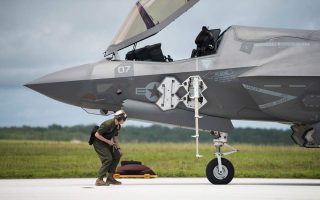On board a Hellenic Navy frigate, fresh from the Red Sea
Captain and commander of MEKO 200 Class Psara talk about 96-day deployment thwarting Houthi threat as part of Operation Aspides

There is always something quite special in the feeling an outside observer gets when visiting a unit of the Hellenic Navy, even if it is not on a mission at sea. The first striking impression is that of a very closely knit community of men and women in blue uniforms; even when they’re joking with each other, their demeanor emanates respect, camaraderie and support. Perhaps this is why all 198 crew members of the frigate Psara cannot wait to embark on their next mission, even though they only recently sailed back to the Salamina Naval Base after spending 96 days in the Red Sea and the Gulf of Aden as part of the European Union’s Operation Aspides.
Kathimerini had the privilege of being the only newspaper to visit the frigate and speak with Captain Panagiotis Sassaris and Commander Epameinondas Michalakis, two officers who, after an operation focused on bringing down Houthi drones, now belong to a small category of navy officers with actual combat experience.
Our conversation begins with an issue that is very much on their minds: the future of the fleet, both in terms of equipment and personnel, especially following a recent spate of resignations.
“What I can tell you is that of the 198 officers who took part in the mission, not one will be resigning, not a single one,” says Captain Sassaris, adding that a significant number of the crew, around 30, are young and returned from what was their first mission overseas filled with enthusiasm. It is also encouraging to learn that there were 24 women on the crew, occupying key positions.

We ask Sassaris what makes a career in the navy so attractive, and he answers with disarming honesty. “Because it provides you with the opportunity to travel all over Europe and often beyond,” he says, adding the allure of being paid to travel and having a steady paycheck. For Sassaris himself, however, the sea was always an important part of his life so joining the navy was more than a career opportunity. Now that he is ready to step down as captain he wonders how he will adapt to life on land.
For Commander Epameinondas Michalakis, a career in the Hellenic Navy is an excellent choice for people “looking for a challenge,” while salaries have also improved lately, with the introduction of new allowances for missions at sea.

The MEKO 200 Class Psara is one of the Hellenic Navy fleet’s relatively young ships, even though it is 26 years old and has flown the Greek flag across the world, from Scotland to Somalia. It is, however, a type of ship that is considered dated, though Sassaris is proud to say that the crews of the other admittedly more modern European ships in Operation Aspides were surprised by its capabilities.
“Foreigners are impressed by our performance because they regard the ship as old,” he says, going on to refer to the Centaur anti-drone system developed by the Hellenic Aerospace Industry (EAV) and used to down hostile Houthi UAVs.
The captain and commander cannot expand on the details of the mission, which are confidential, but, as Michalakis says, “the crew returned with all sorts of new experience; and it is experience that sticks.”

Sassaris comments on the “moment before you press the button” deploying a weapons system. “It lasts less than a minute, but it seems so much longer,” he says. The captain also describes the crew’s reaction when a threat appears: “Everyone takes position,” he says. There are no delays, orders are obeyed instantly and, despite the obvious tension, everyone behaves in a calm and concerted manner. Sassaris attributes this level-headedness to professionalism. Later, as we are shown around the Psara and the captain is out of earshot, his second-in-command attributes it to Sassaris himself. “The captain is the one who made all the difference because he was always calm,” says Michalakis. “I want the ship to be like a church when we’re on a mission: without raised voices, without unnecessary tension,” Sassaris admits later, as we sit in his office.
Our conversation turns to how different the mission would have been on a modern ship. “We would do our job on a canoe,” quips Sassaris. “It would just be easier with new systems.”
‘Demonstration of deterrence’
The Psara returned from the Gulf of Aden, where it had spent three months on the route between Djibouti and the port of Salalah in Oman, escorting cargo ships and tankers. A lot of lessons and information were gleaned on the mission that will be studied by the Hellenic Navy. Among its many experiences was the task of providing protection to the Greek-flagged MT Sounion, which is now in the north of the Red Sea.
For the Psara’s captain, there are two important takeaways from the mission. “To begin with, the Greek flag was displayed in a part of the world where only a few forces are operating right now,” says Sassaris. More importantly, however, he says, “the success of our mission was a demonstration of deterrence and others watched us as we accomplished our goals.”
These experiences out in the “battlefield” will be transferred to the navy’s new FDI frigates, as the officers to man the Kimon, currently under construction, have already been selected.
Upon his return from the Gulf of Aden, Sassaris turned over the Psara to its new captain. Of the 18 months he spent at the helm of this ship, 367 days were at sea, conducting missions in Greece and other parts of the world. Now, his experience will benefit the Hellenic Navy General Staff, where he will continue to serve. And he will look back on all these years at sea as the best of his life. Summing it all up, he says: “The navy is its ships. Everyone in the navy is here because of the ships. Everything else comes second.”





